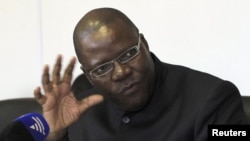HARARE —
The International Monetary Fund (IMF) says it is concerned by the failure of Sudan, Somalia and Zimbabwe to honor their commitments to pay their financial debts. This comes at a time when Zimbabwe’s finance minister says he expects some clemency from the IMF over Zimbabwe’s $10 billion external debt.
In a report entitled Review of the Fund’s Strategy on Overdue Financial Obligations released this week, the IMF said Zimbabwe and the war-ravaged nations of Sudan and Somalia are the three African defaulting countries.
Somalia and Sudan have accumulated obligations dating back to the mid-1980s, while Zimbabwe has been in arrears since 2001.
Ahead of the report's release, Zimbabwean Finance Minister Tendai Biti said he hoped the IMF would announce good news next week to the African nation, which has a $10 billion debt.
"We believe that our macro-economic fundamentals are sound, and that there is no reason at all why a positive decision would not be made in our favor," he said. "The importance of that IMF decision is that it will enable us to deal with the key issues of arrears that are the hindrance, [as] are sanctions, against Zimbabwe accessing huge levels of capital finance at the World Bank and the African Development [Bank].”
Recently, Zimbabwe's government refused to adopt the Highly Indebted Poor Countries (HIPC) status, which would have resulted in the country mortgaging its mineral resources against its huge debt.
Zimbabwe’s agricultural-based economy took a nosedive in early 2000 when the country embarked on a chaotic and violent land reform exercise targeting white commercial farmers, seizing their farms, and replacing many of them with peasant farmers.
After a decade of decline, the country has improved somewhat since the creation of a unity government in 2009. But Biti has said the recovery will remain weak and precarious until Zimbabwe receives international assistance to get its industries back on track.
In a report entitled Review of the Fund’s Strategy on Overdue Financial Obligations released this week, the IMF said Zimbabwe and the war-ravaged nations of Sudan and Somalia are the three African defaulting countries.
Somalia and Sudan have accumulated obligations dating back to the mid-1980s, while Zimbabwe has been in arrears since 2001.
Ahead of the report's release, Zimbabwean Finance Minister Tendai Biti said he hoped the IMF would announce good news next week to the African nation, which has a $10 billion debt.
"We believe that our macro-economic fundamentals are sound, and that there is no reason at all why a positive decision would not be made in our favor," he said. "The importance of that IMF decision is that it will enable us to deal with the key issues of arrears that are the hindrance, [as] are sanctions, against Zimbabwe accessing huge levels of capital finance at the World Bank and the African Development [Bank].”
Recently, Zimbabwe's government refused to adopt the Highly Indebted Poor Countries (HIPC) status, which would have resulted in the country mortgaging its mineral resources against its huge debt.
Zimbabwe’s agricultural-based economy took a nosedive in early 2000 when the country embarked on a chaotic and violent land reform exercise targeting white commercial farmers, seizing their farms, and replacing many of them with peasant farmers.
After a decade of decline, the country has improved somewhat since the creation of a unity government in 2009. But Biti has said the recovery will remain weak and precarious until Zimbabwe receives international assistance to get its industries back on track.










